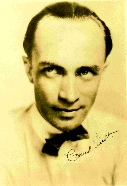
The Conrad Veidt Society
Article from ''Picture Show'' Magazine
Probably 1936
Calling on Conrad Veidt at his Hampstead home is one of the most delightful experiences the social round of British filmland has to offer.
The reason lies not only in the house, but also in the personality of the tenant. Be it villainous or valiant, there is something 'human' and appealing about every role Veidt, the actor, plays on the screen. But none of these roles has ever given us more than a glimpse of the real 'Connie' Veidt to whom I am going to introduce you this week.
From the minute you enter the bright red gate of ''Milestones,'' you feel that this could only be the home of a personality. Of unusual but artistic design, and standing farther back from the road than its neighbours in this terrace, it is at once dignified and intriguing.
No sooner has the maid answered my ring than my host appears to greet me in the hall. His welcome is spontaneous, friendly, and as informal as the grey flannels and suede golf jacket he is wearing. Typical of the real 'Connie' that. He knows that I have come to visit him as he is in everyday life so he doesn't bother to 'dress up'.
Introductions over, he escorts me to the living room, and never was a room more aptly named. ''It is here in this room, '' he once told me, ''that I study my parts, write my letters, meet my friends, and dream my dreams. It is in short, the cog around which my whole life revolves.''
The huge red brick fireplace, occupying almost all of one side, catches my eye, and
the fascinating corner windows, beautifully engraved grandfather's clock, rich silken
sofas, antique cabinets and chairs, combine to create an impression of peaceful old-
'Connie' smiles as my admiring glances wander round the room. ''I am so sorry,'' he says, ''that my wife is not here to show you round. But she has gone to Austria where I will join her next month with my small daughter, Viola. She is at school in Switzerland you know and every year we have this holiday together. So you see I am a lonely grass widower at the moment! But I will do my best and am sure I speak for both of us when I say that this is our favourite room and that we love it, for the same reasons. It is quiet, it is restful, it is comfortable, and to us these things are the real essentials of life.''
That last sentence tells you interesting things about 'Connie's' character. Only very seldom will you find the Veidts' 'going places'. Both of them would much rather stay at ho
I see that 'Connie' is edging towards the art [?] green curtains behind which lies
the dining room. Papered in dull gold and furnished in oak with red upholstered chairs,
it is a compact, cosy room which once more reflects his love of charm and comfort
rather than grandeur. Tall French windows open on to the lawn where he likes to bask
in the sun -
I have told you that parties are the exception in the Veidt home. That is true. But
informal little dinners are different, and many famous folk have broken bread with
'Connie' and his wife in this homely room. His present friends in British pictures
frequently drop in of an evening for friendly chats, and last summer Marlene Dietrich
spent a Sunday talking of the happy back-
As we pass through the hall and up the solid mahogany staircase to the bedrooms, I admire the beautiful etchings and prints of dogs and hunting scenes hanging on the panelled walls. Most of them are originals, old, and very valuable.
'Connie's' own bedroom is warmly decorated in rich golds and browns, relieved by
the pastel green and grey cover of the long Queen Anne bed. It is essentially a masculine
room and the business-
A connecting door leads to Mrs. Veidt's room, a delightful symphony of rose, pale
green, grey and cream, with French windows leading on to an ivy-
''And that,'' says 'Connie', when we have returned to the lovely living-
'Connie's' mention of his acting reminds me that the nature of his screen roles is
creating quite a controversy amoung film-
''It is,'' he says at length, ''not easy for me to answer that question. But I am
glad you asked because these varied opinions from film-
Of Conrad Veidt it has been written that ''no one will ever completely understand him.'' That may or may not be true. Personally, I have enjoyed his friendship for some years now and have grown to admire and respect him.
By that I mean that I admire his ability and culture but respect him for his sterling
qualities of sincerity, kindness and never failing courtesy. And these I feel must
surely be in all our thoug![]() hts as we say ''auf weidersehen'' to the friendly fellow
whom his friends know as 'Connie' Veidt.
hts as we say ''auf weidersehen'' to the friendly fellow
whom his friends know as 'Connie' Veidt.